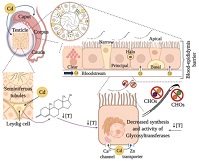Reproduction, Fertility and Development
Volume 33
Number 5 2021
Di-n-butyl phthalate (DBP) is ubiquitous in the environment because of the increased use of food packaging, cosmetics, varnishes, printing ink and biomedical devices, and causes testicular toxicity. However, the underlying mechanism in quails is not yet clear. The present findings suggest that DBP decreases serum LH and testicular testosterone concentrations by suppressing the hypothalamic–pituitary–testicular axis and that this may be involved in the increased germ cell apoptosis seen in quails.
Testicular dysfunction can be repaired using trans-resveratrol (RSV), but the underlying mechanism was unclear. This study revealed that cryptorchid surgery seriously disturbed testicular metabolites in mice and that these changes were restored to some extent after RSV treatment in association with clinical features. This study provides a new systems approach to elucidate the metabolic and therapeutic effects of RSV in murine spermatogenesis.
Global gene expression of the bovine whole embryo or isolated trophectoderm from fresh or vitrified day-14 embryos was profiled by RNA sequencing, which identified specific pathways and implicated specific gene expression patterns affecting embryo developmental competence that are important to cryopreservation.
Exposure to cadmium in early postnatal stages causes a decrease in testosterone levels and alterations in the epididymal epithelium that can affect its structure and functioning, in turn, affecting the assembly of carbohydrates on the sperm membrane surface to capacitate it for successful fertilisation of the oocyte.
The expression of miR-18b is crucial for the synthesis of oestradiol of female mammals. miR-18b acts as a negative regulator of the production of enzymes related to the synthesis of oestradiol and affects oestradiol production by directly targeting the oestrogen receptor 1 (ESR1) gene. Overexpression of miR-18b positively acts in regulating granulosa cells apoptosis.
This study evaluated the effects of three maturation systems, namely in vitro and in vivo systems, as well as intrafollicular transfer of immature oocytes (IFIOT), on the accumulation of lipid droplets in bovine oocytes. The results indicate that oocytes matured by IFIOT are similar to those matured in vivo with regard to lipid accumulation, which indicates better quality than those matured in vitro.











